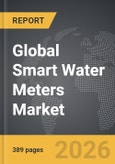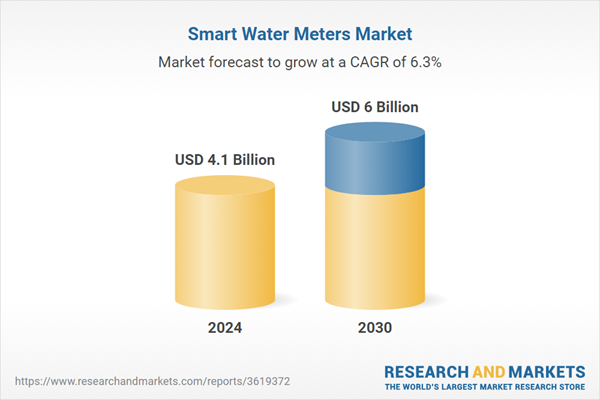Global Smart Water Meters Market - Key Trends & Drivers Summarized
What Are Smart Water Meters and How Do They Revolutionize Water Management?
Smart water meters are advanced devices that measure water consumption in real-time and transmit this data back to both utility providers and consumers, facilitating more efficient water use and management. Unlike traditional meters, smart water meters use technologies such as radio frequency, cellular communication, or power line communication to automatically send the consumption data. This capability not only eliminates the need for manual meter readings but also significantly enhances data accuracy and frequency. For consumers, these meters provide detailed insights into their water usage patterns, enabling them to identify leaks and inefficiencies in real-time, which can lead to substantial water and cost savings. For water utilities, the instantaneous reporting and analysis help in managing supply more effectively, predicting demand, and reducing operational costs through improved system monitoring and maintenance.How Do Smart Water Meters Contribute to Sustainable Water Practices?
In the era of growing environmental concerns and increasing water scarcity, how can smart water meters contribute to more sustainable water management practices? Smart meters are pivotal in promoting water conservation. They allow both consumers and utilities to monitor water usage patterns and identify anomalies, such as leaks or bursts, almost immediately. This prompt detection and resolution of issues not only save water but also prevent larger, costly damages and water loss. Additionally, smart water meters support tiered water pricing strategies, where consumers are charged based on the volume of water they use, encouraging lower consumption and more mindful usage patterns. Utilities can leverage the detailed data from these meters to optimize water treatment processes and distribution efficiency, reducing energy use and minimizing environmental impacts.What Challenges and Innovations Shape the Smart Water Meter Industry?
What are the main challenges facing the deployment of smart water meters, and what innovations are emerging to tackle these obstacles? One significant challenge is the initial high cost and complexity of installing smart metering infrastructure, especially in regions with old or extensive water systems. Privacy and security concerns also arise with the collection and handling of large volumes of consumer data. To address these issues, industry players are focusing on developing more cost-effective metering solutions and robust cybersecurity measures to protect data integrity and privacy. Technological advancements such as enhanced battery life, integration with IoT platforms, and the development of meters capable of providing more granular data are also key trends. These innovations not only improve the functionality and appeal of smart water meters but also broaden their applicability across various water management scenarios.What Drives the Growth in the Smart Water Meter Market?
The growth in the smart water meter market is driven by several factors. The increasing global focus on water conservation amid rising environmental concerns and water scarcity is perhaps the most significant catalyst. As governments and environmental agencies enforce stricter regulations on water usage and reporting, utilities and consumers alike are adopting smart meters to comply with these new standards. Technological advancements that enhance meter functionality and integration capabilities with other smart grid systems are also key drivers. Moreover, the expanding IoT in utility infrastructures makes it feasible and beneficial to include smart metering solutions. Consumer behavior is another driving force; as awareness of sustainability issues grows, so does demand for technologies that support eco-friendly practices and provide cost savings. Lastly, urbanization in developing countries and subsequent improvements in water infrastructure are accelerating the deployment of smart water meters, fueling market expansion. These factors collectively contribute to the robust growth trajectory of the smart water meter industry, demonstrating their critical role in future water management strategies.Report Scope
The report analyzes the Smart Water Meters market, presented in terms of market value (USD). The analysis covers the key segments and geographic regions outlined below.- Segments: Technology (Auto Meter Reading (AMR), Advanced Metering Infrastructure (AMI)); Application (Residential, Industrial, Commercial).
- Geographic Regions/Countries: World; USA; Canada; Japan; China; Europe; France; Germany; Italy; UK; Rest of Europe; Asia-Pacific; Rest of World.
Key Insights:
- Market Growth: Understand the significant growth trajectory of the Residential Application segment, which is expected to reach US$3.2 Billion by 2030 with a CAGR of 6.8%. The Industrial Application segment is also set to grow at 6.1% CAGR over the analysis period.
- Regional Analysis: Gain insights into the U.S. market, valued at $1.1 Billion in 2024, and China, forecasted to grow at an impressive 6% CAGR to reach $929.5 Million by 2030. Discover growth trends in other key regions, including Japan, Canada, Germany, and the Asia-Pacific.
Why You Should Buy This Report:
- Detailed Market Analysis: Access a thorough analysis of the Global Smart Water Meters Market, covering all major geographic regions and market segments.
- Competitive Insights: Get an overview of the competitive landscape, including the market presence of major players across different geographies.
- Future Trends and Drivers: Understand the key trends and drivers shaping the future of the Global Smart Water Meters Market.
- Actionable Insights: Benefit from actionable insights that can help you identify new revenue opportunities and make strategic business decisions.
Key Questions Answered:
- How is the Global Smart Water Meters Market expected to evolve by 2030?
- What are the main drivers and restraints affecting the market?
- Which market segments will grow the most over the forecast period?
- How will market shares for different regions and segments change by 2030?
- Who are the leading players in the market, and what are their prospects?
Report Features:
- Comprehensive Market Data: Independent analysis of annual sales and market forecasts in US$ Million from 2024 to 2030.
- In-Depth Regional Analysis: Detailed insights into key markets, including the U.S., China, Japan, Canada, Europe, Asia-Pacific, Latin America, Middle East, and Africa.
- Company Profiles: Coverage of players such as Huawei Technologies Co., Ltd., Honeywell International, Inc., Badger Meter, Inc., Arqiva Ltd., Aclara Technologies LLC and more.
- Complimentary Updates: Receive free report updates for one year to keep you informed of the latest market developments.
Some of the 82 companies featured in this Smart Water Meters market report include:
- Huawei Technologies Co., Ltd.
- Honeywell International, Inc.
- Badger Meter, Inc.
- Arqiva Ltd.
- Aclara Technologies LLC
- Apator SA (Apator Group)
- Arad Group
- Datamatic, Inc.
- Diehl Stiftung & Co. KG (Diehl Group)
- Iskraemeco d.d.
- Capstone Metering LLC (IntelliH20)
- Hangzhou Laison Technology Co., Ltd.
- ista Energy Solutions Ltd.
- Commonwealth Edison Company (ComEd)
- Enware Australia Pty., Ltd.
This edition integrates the latest global trade and economic shifts into comprehensive market analysis. Key updates include:
- Tariff and Trade Impact: Insights into global tariff negotiations across 180+ countries, with analysis of supply chain turbulence, sourcing disruptions, and geographic realignment. Special focus on 2025 as a pivotal year for trade tensions, including updated perspectives on the Trump-era tariffs.
- Adjusted Forecasts and Analytics: Revised global and regional market forecasts through 2030, incorporating tariff effects, economic uncertainty, and structural changes in globalization. Includes historical analysis from 2015 to 2023.
- Strategic Market Dynamics: Evaluation of revised market prospects, regional outlooks, and key economic indicators such as population and urbanization trends.
- Innovation & Technology Trends: Latest developments in product and process innovation, emerging technologies, and key industry drivers shaping the competitive landscape.
- Competitive Intelligence: Updated global market share estimates for 2025, competitive positioning of major players (Strong/Active/Niche/Trivial), and refined focus on leading global brands and core players.
- Expert Insight & Commentary: Strategic analysis from economists, trade experts, and domain specialists to contextualize market shifts and identify emerging opportunities.
Table of Contents
Companies Mentioned (Partial List)
A selection of companies mentioned in this report includes, but is not limited to:
- Huawei Technologies Co., Ltd.
- Honeywell International, Inc.
- Badger Meter, Inc.
- Arqiva Ltd.
- Aclara Technologies LLC
- Apator SA (Apator Group)
- Arad Group
- Datamatic, Inc.
- Diehl Stiftung & Co. KG (Diehl Group)
- Iskraemeco d.d.
- Capstone Metering LLC (IntelliH20)
- Hangzhou Laison Technology Co., Ltd.
- ista Energy Solutions Ltd.
- Commonwealth Edison Company (ComEd)
- Enware Australia Pty., Ltd.
Table Information
| Report Attribute | Details |
|---|---|
| No. of Pages | 389 |
| Published | February 2026 |
| Forecast Period | 2024 - 2030 |
| Estimated Market Value ( USD | $ 4.1 Billion |
| Forecasted Market Value ( USD | $ 6 Billion |
| Compound Annual Growth Rate | 6.3% |
| Regions Covered | Global |









